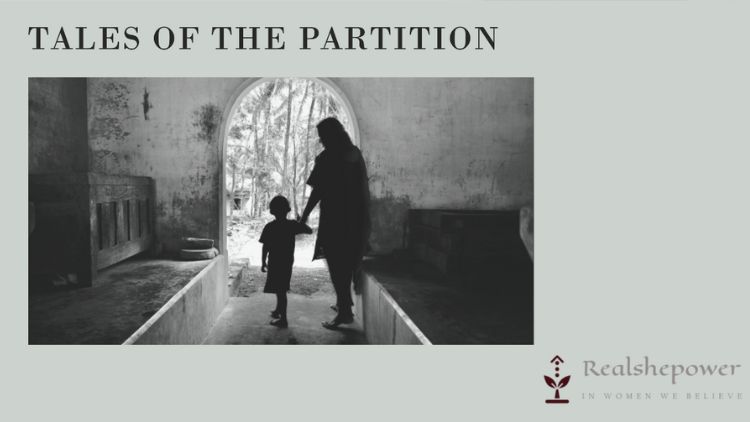A Mother’s Silence: The Unutterable Agony of Partition


Amid the undulating fields of what would soon become West Punjab, stood the quaint village of Parbatpura. Lush mustard fields, the scent of ripening mangoes, and the gentle hum of folk songs characterized this serene haven. But 1947 was not to be a year of serenity.
Kalpana, a poised woman in her mid-thirties, was the backbone of her household. A mother of three – two daughters, Radha and Kavita, and a son, Hari – she was revered not just within the confines of her home but throughout Parbatpura. Her tales of wisdom, her medicinal herb garden, and her soulful lullabies were the stuff of village legends.
As August approached, the air in Parbatpura grew tense. The elders, usually immersed in discussions about harvests and weddings, now whispered of borders, migrations, and potential violence. Kalpana heard rumors but chose to believe in the innate goodness of humanity.
One evening, as the sun painted the sky in hues of red, a chilling scream reverberated through Parbatpura. A neighboring house was aflame, its orange tongues licking the darkening sky. Within moments, chaos ensued. Armed mobs, faces twisted in rage and eyes blinded by hatred, descended upon the unsuspecting village.
Kalpana’s world crumbled in mere hours. Her home, a symbol of years of love and toil, was razed. As she attempted to flee with her children, she was intercepted by the mob. What followed was an ordeal so traumatic that words fail to capture its essence. Her daughters, mere teenagers, were taken away, their helpless cries echoing in her ears. Hari, all of fifteen, tried to resist and was instantly silenced by a brutal blow.
Left for dead amidst the smoldering ruins of Parbatpura, Kalpana’s spirit was shattered, but a feeble heartbeat persisted. Days later, she was discovered by a caravan of refugees heading towards the new India. They nursed her back to physical health, but the scars on her soul ran deeper than any medicine could heal.
Kalpana, once the vibrant storyteller of Parbatpura, now remained silent. The lullabies were replaced by haunting silences, the tales of wisdom by vacant stares. The weight of her loss rendered her mute. She never spoke of that night, but those around her didn’t need words. Her eyes, sunken and perpetually moist, told a tale more harrowing than any spoken account could.
In the refugee camps of Delhi, Kalpana found shelter but not solace. Children, sensing her boundless pain, would approach her, offering small tokens of love – a flower, a handmade doll, a tune on the flute. Kalpana would smile weakly, holding them close, seeking in their warmth, fleeting moments of respite from her haunting memories.
Time, they say, heals all wounds, but some scars are too deep, too raw to ever fade away. Kalpana’s story, though never voiced, became a testament to the untold horrors countless women faced during the Partition. Her life was a poignant reminder of the cost of division, the fragility of peace, and the indomitable strength of a mother’s spirit.
A Call to Our Readers: Share Your Story
Partition was not merely a line drawn on a map, but a scar left on the hearts of millions. The legacy of those traumatic times lives on in the memories of survivors and the tales handed down through generations. While the pain and anguish of that era might be overwhelming, there’s healing in remembering and sharing.
We firmly believe that to truly understand the depth of that experience and to heal collectively, it’s essential to bring these stories to light. Trauma can fester in silence, but sharing has the power to heal wounds, bridge divides, and remind us of our shared humanity.
If you or your loved ones have stories from the Partition, we urge you to share them with us. Send your narratives, memories, and anecdotes to admin@real-shepower.com. Let’s not allow these tales to fade into oblivion. By sharing, we not only pay homage to the resilience and spirit of those who lived through the upheaval but also provide a space for understanding, empathy, and collective healing.
The stories of Partition belong to all of us — they are a testament to our shared past, our resilience, and our hope for a harmonious future. Let’s give them the voice they deserve.
